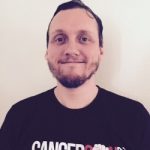Featured Fighter – Erin Havel
September 29, 2015
By: Erin Havel
BASIC INFO:
Name: Erin Havel
Age: 38
Hometown: Naperville, Illinois U.S.
Occupation: Writer
Diagnosis: Chronic Myelogenous Leukemia (CML)
If you were a professional boxer or wrestler, what would your name be? I couldn’t think of one so I used the online generator and it came up as “Irksome Spartan.” This actually probably fits, as I am somewhat of a Spartan warrior who probably irks some people because I write and speak up against the atrocities I see.THE FRIGHT:
I was diagnosed ten days after my 30th birthday and I remember feeling trapped in my body. My soul felt claustrophobic in my skin, if that makes any sense. I wanted it out of me, I wanted to escape, but because the cancer was in my blood it wasn’t something that could be cut out. The same blood that was keeping me alive was now also killing me. It felt surreal. At one point my hearing became muffled and I was split from myself.
I had spent the previous 9 months battling with my health insurance company to return to treatment on a separate medical issue and was under a tremendous amount of stress. I blamed myself for the cancer because there is no sound reason for why people get CML, and I’m the type of person who needs reason. To this day, I think the cancer came on because of that tremendous stress I was under, prior to diagnosis.
What frightened me most was that my life was ending and I had wasted my short amount of time on this earth focused on nothing of any lasting value. I was scared that nothing I had achieved would leave any kind of legacy and I would be forgotten.
THE FIGHT:
The weird thing about CML is that up until about 15 years ago it was almost certainly a death sentence. Traditional chemotherapy did not work, and bone marrow transplants were not totally effective as a cure. Thankfully, a drug that targeted the CML specific cells was created (in the early 2000s) and proved effective for many patients.
The “catch” is that the targeted chemotherapy is in a daily pill form, and it is not a cure. The drug turned my cancer into a chronic illness that I will live with for potentially a normal life span. This is a blessing, but it’s not without its difficulties. I still go in to the cancer center every 3 months for tests to make sure the chemo is still working and a mutation has not developed. I am on chemotherapy every day without a break, which is tremendously hard and toxic on the body. The CML drugs have not been around long enough to truly know long term effects. Also, there were scandals regarding the drug company when this type of chemo was first approved, that we are only recently learning about. Apparently, the drug company’s sales people worked with the doctors to determine the severity of each side effect, and many of the documented side effects were actually shredded to avoid negative pushback against the drug’s approval.
With the exception of the very few CML specialists scattered throughout the country, many doctors are oblivious to the daily struggles of taking these meds; there is a sense of “you should be grateful to be alive” rather than “how can we help minimize the side effects you’re dealing with.”
And when your local oncologists cannot even understand your side effects, you can imagine how difficult it is for employers, co-workers, assistance programs, friends, and family. The trouble is, most CML patients on these drugs keep their hair, and therefore don’t “look” like proverbial cancer patients even though we deal with many of the same side effects traditional chemotherapy patients experience. There is a real lack of compassion for what is commonly termed “invisible illness.”
Then there is the cost. When I first started taking the daily chemo it cost $3,000 a month in the United States, now it’s up to $9,000 a month. The American health care system is still broken, despite the attempts to improve it. The trouble we have is that we treat health care the same way we treat any other money making business. Profits are king, and stock holders are the ones with a voice, not the patients/consumers. For the first 5 years of being on the chemo, I would have to battle with my insurance to cover their portion of the cost, even though the treatment my doctors requested is the standard of care for my cancer.
FIGHTING THE FRIGHT:
What has helped me the most during the toughest times of battling with the insurance, side effects, test results, and lack of compassion, is having others around me who care enough to listen. That circle extends far beyond my family and friends and includes other patients, acquaintances, and young adult cancer survivors I haven’t even met in person. They may not all completely understand what I’m going through, and sometimes even say the “wrong” things in attempts to help, but they are there.
Keep talking. It’s important not only for yourself, but for the ones who haven’t been through what we’ve been through. Cancer touches almost every life on this planet at one point or another. It stinks, because you may be the first cancer ‘expert’ your loved ones come in contact with, but there is power and purpose in that position. You’ve become an unexpected teacher, and maybe by listening to and watching your journey, your loved ones will better handle their future paths. Maybe, some of your struggles will be lessened for the next patient not yet diagnosed, all because you kept talking. You have an invaluable voice that needs to be heard.
“Speak your mind, even if your voice shakes.” Maggie Kuhn





